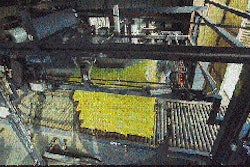The proposed regulations call for the use of maximum achievable control technology (MACT). FPA believes a MACT standard would impose costly new requirements on the packaging and printing industry that often are unproductive. FPA's arguments are in line with those of regulatory reformers on Capitol Hill who say regulations should be aimed at real risks, when benefits outweigh costs. The MACT standards might well fail the mandatory risk analysis and cost/benefit analysis required in regulatory reform bills now pending in Congress. FPA's suggested modifications include: * Using data supplied by large ink manufacturers to determine the level of hazardous air pollutants for all coatings, inks, lacquers and other such materials used by packaging manufacturers, rather than requiring manufacturers to determine the levels, using a testing method that could cost up to $1ꯠ per sample; * Take into account controls, hours of operation and other restrictions that might limit hazardous air pollution emissions when regulating companies on their potential to emit; * Allow manufacturers to compare beginning and ending inventories of solvents purchased, rather than require them to trace and measure each solvent used on the job to demonstrate compliance for each individual press; * Determine compliance to the standard on a plant-wide basis rather than by individual press lines. FPA said this change alone could reduce yearly reporting and recordkeeping costs per plant from $20ꯠ to $250ꯠ. * Require performance tests of control devices only when they are installed or a major modification to a press is made that would affect the efficiency of capturing emissions, and * Eliminate or put a moratorium on state air toxins programs until all MACT standards have been adopted. "If EPA accepts our final recommendations, the proposed standard will achieve the goals of the Clean Air Act without gutting industry's ability to meet business objectives," said FPA President Glenn Braswell. The final rule must be signed by March 1, 1996.
FPA seeks sensible EPA emissions rules
The Environmental Protection Agency's (EPA) pledge to work more closely with the industries it regulates will be put to the test by a request from the Flexible Packaging Association (FPA) to revise its proposed regulations on emissions of hazardous air pollutants.
Aug 31, 1995
Machinery Basics
Annual Outlook Report: Workforce
Hiring remains a major challenge in packaging, with 78% struggling to fill unskilled roles and 84% lacking experienced workers. As automation grows, companies must rethink hiring and training. Download the full report for key insights.
Download Now
Annual Outlook Report: Automation & Robotics
What's in store for CPGs in 2025 and beyond? Packaging World editors explore the survey responses from 118 brand owners, CPG, and FMCG Packaging World readers for its new Annual Outlook Report.
Download
Downloads




















